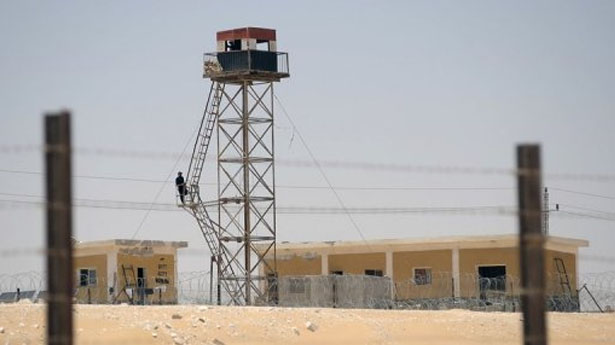The death of a detainee at the Maadi Police Station on Saturday added to the already mounting concerns over detention conditions in Egyptian prisons.
The detainee died of electrocution while attempting to extend an electric wire from the bathroom to his prison cell, according to the Ministry of Interior’s media office. The ministry denied that negligence was the cause of the detainee’s death, claiming that the testimony of other detainees confirmed their story. The prosecution is looking into the incident, the ministry said.
Nagwa Al-Sebaay, a friend of three detainees currently held at the Maadi Police Station, cited accounts by detainees claiming that the dead detainee was electrocuted in his sleep by an exposed wire in his prison cell.
Al-Sebaay’s friends are among 16 detainees arrested on 25 January, in the backdrop of protests marking the third anniversary of the 2011 revolution. They remain preventively detained at the Maadi Police Station, amid conditions described by their lawyer Mahmoud Abdel Gawad as “inhumane”.
Abdel Gawad said the number of detainees the police station is harbouring is too high for its size. Al-Sebaay said that at least three of the detainees have caught a fever during the weekend.
Mother of detainee Saber Ahmed said her son, whom she claims was randomly arrested, suffers from asthma and needs medication.
Abdel Gawad said they are disinclined to complain about the detainees’ conditions for fear that they be moved to Tora Prison. He added that at Tora Prison, families would not be able to visit the detainees as they do now.
The 16 detainees include four minors who were moved to a juvenile facility, where they complained of worse detention conditions. The detention of the group of 16 has been renewed twice for 15 days. Fifteen of the detainees appealed the second detention order and the Zeinhom Court accepted the appeal on Thursday, ordering their release on bail of EGP 500.
The prosecution nevertheless appealed the release order, in a move described by Abdel Gawad as violation to Article 176 of the Criminal Law, which states that “an appeal cannot be appealed”. On Saturday, the North Cairo Court accepted the prosecution’s appeal to the release order.
Most detainees arrested on 25 January are accused of involvement in a banned organisation, or one that aims to disrupt the law, or joining a mob, among other charges.
On Saturday, Prosecutor General Hisham Barakat ordered the release of female detainee Dahab Hamdy from custody one day after she delivered a child while in detention. The public prosecution received a memorandum on Friday notifying them that Hamdy was going into labour; subsequently, her transfer to hospital was ordered, the prosecution said in a statement released on Saturday.
Hamdy made the headlines after a photo of her, in handcuffs right after delivering her child, went viral on different media outlets. The public prosecution said they have investigated the incident. They claimed Hamdy was only handcuffed when a group of “veiled” women arrived to pay her a visit.
“Due to the impossibility of any policemen’s presence inside Hamdy’s room during the visit, the detainee was shortly handcuffed,” the prosecution’s statement read, adding that the handcuffs were taken off as soon as the visitors left the room.
Hamdy’s husband, meanwhile, told Saudi news network MBC on Saturday that his wife was handcuffed while being transferred to hospital. He claimed that the handcuffs were only taken off during labour, and that she was handcuffed again as soon as she was out of the operation room. When he asked the policeman guarding Hamdy to take off the handcuffs, the husband claims he was told he had instructions to keep her in handcuffs “all the time”.
The prosecutor general ordered Hamdy’s release “to allow her to care for her newborn,” the statement read. Barakat also ordered the prosecution to swiftly complete its investigation into Hamdy’s case.
Hamdy was arrested on 14 January among a group of other women and four men, including a female journalist at the Freedom and Justice Party’s (FJP) newspaper, according to the prosecution’s statement. She is accused of assembly, spreading chaos, blocking roads, stalling traffic, and inciting citizens to vote No to the constitution.
A total of 1,079 people were arrested on 25 January, as the revolution’s anniversary was marred by deadly violence. Decisions on the detainees were made by various prosecutions, depending on where they were arrested. A large number of detainees have complained from harsh detention conditions, most of whom claiming to have been tortured.
Detention conditions for those arrested on the revolution’s anniversary have been condemned by political parties and several human rights organisations, such as Amnesty International, the Nation without Torture Campaign and the Freedom for the Brave Campaign.
In a joint statement released Wednesday, a group of 16 domestic human rights organisations accused the police forces of torturing and sexually assaulting detainees.
The Ministry of Interior, however, denied torture allegations reported by those who had been preventively detained. In a statement released on Tuesday, the ministry expressed its readiness to receive complaints from inmates, adding it will look into such complaints and take “decisive measures” against all those who are found complicit in committing “violations or delinquencies”.


